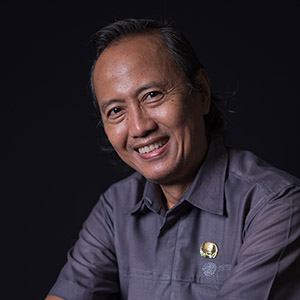
Prof. Dr. R. Danardono A.Sumarsono, DEA, PE.,
danardon@eng.ui.ac.id
Educational Background
1983 – Mechanical Engineering, Universitas Indonesia
1989 – Mecanique des Solid, Ecole Centrale de Lyon, France
1993 – Mechanical Engineering, Universite d’Orleans, France
An electric vehicle is an alternative solution to various transportation problems in Indonesia. Environmentally friendly and sustainable are ideals for the independence of the country’s automotive industry and national security. One of them includes energy security which, until now, drains the country’s foreign exchange because it uses fossil fuels in various modes of transportation in many cities in Indonesia.. Universitas Indonesia (UI), as a center for scientific researches and developments, wants to be at the forefront in producing innovations benefitting the Indonesian people. Adhering to the Tri Dharma principles of Higher Education namely Teaching, Research, and Community Service, UI through its Department of Mechanical Engineering of Faculty of Engineering (FTUI), has presented a lot of innovations and researches aimed at improving the community’s quality of life through various programs based on the latest technology in electrical vehicles.
Molina EV-UI
Electric Yellow Bus (e-Bikun) tangibly resulted from studies conducted by the UI National Electric Vehicle Team (Molina UI) consisting of lecturers, researchers and students from various study programs at UI. This initial, innovative e-Bikun electric vehicle will continue to be developed in high hopes that it will someday replace conventional petroleum-fueled campus buses. This e-Bikun, with its 60-passenger capacity, is designed to only go at a maximum speed amounting to 50 km/h on campus and, with its fully-charged battery, it can cover an about 100-kilometer-long distance. To support the design to be fully operated, the research team is currently making several reviews to create an Electric Vehicle Charging Station using electricity from PLN and solar cells. Moreover, the team is also conducting a study related to the economic, legal and socio-cultural aspects of electric vehicle technology from the public’s acceptance perspective. Furthermore, the team will conduct a study in the form of the design concept of the entire system of the electric bus components that will not only be used on campus but also be utilized by the existing public transportation companies in collaboration with local automotive and car body manufacturers.
Hybrid Technology
For nearly two decades, the FTUI Department of Mechanical Engineering team has been researching environmentally-friendly, energy-efficient vehicles and conducting studies on hybrid vehicles based on hybrid technology. In 2011, the prototype of the Makara UI hybrid four-wheeled lightweight electric vehicle model was recognized as a solution to problems arising when electric vehicles were applied in their initial stages. Before electric energy charging system facilities were provided, this hybrid concept was only meant to reduce fuel consumption or increase mileage. The design of this prototype fully adopted the technology of a serial-parallel hybrid vehicle.
The concept of the ‘hybrid’ was then developed further in the form of a four-wheeled light vehicle prototype powered with a combustion motor and an electric motor named BALABI (Bajaj Langit Biru). Currently, the three-wheeled e-Becak prototype with a combination of tilting tricycle models has also been made available to support the local community’s classical public transportation system.
Mechanical Solutions to Road and Building Transportation Systems
In addition to developing electric vehicles, the team is also conducting modeling studies are also to identify and improve the performance of an electric vehicle’s braking systems and other modes of transportation such as Mass Rapid Transportation and Monorail. In this study, the team is also initiating a design of the stair lift unit as a means of mobility assistance especially for senior citizens and people with disabilities when taking stairs on a high rise building.
Quote:
“Electric vehicles are the future solution to realizing environmental sustainability and national resilience in the energy sector.”
– Prof. Dr. Ir. Danardono A. Sumarsono, DEA, PE.